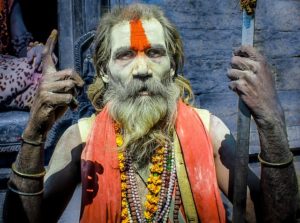We did not create the complexity, wonder, and mystery of the world –and even were we to impact this world of perception, we merely inflect and modify, but do not fundamentally ordain its form. And this appears true whether the world is material, as objectively existent other, or idea, as a derivative of Mind.
I write Mind with a capital “M” because it is not our mind with a small “m” that creates the forms of existence. No intention, concept, or aim known to our individual mind accounts for existence. Furthermore, our will alone does not create, but juxtapositions and arranges within the world of existence.
We are permitted to play with a set of objects and explore relations in a bounded, but infinitely rich world. Infinite, as I use it, is employed in the macroscopic and microscopic sense, both above and below; in the vertical and horizontal sense, both in the singular and the plural world of objects; and both synchronically and diachonically, both at a time and in time.
Eastern religious traditions contend that we can set aside mind with a small “m”, and adopt the greater awareness of Mind with a capital “M”. Through this action we may directly apprehend essences and significances of object, pattern, and existence. We may then appreciate the significances that inhere in universal Mind and thereby adjust the self’s purposes and operation of everyday mind and conduct with Mind.
But when Mind so apprehended is realized, can Mind be employed by everyday mind to modify the nature and operation of things? The answer within these traditions appears to be a qualified “yes”. In yogic and Buddhist traditions, powers of various types are presumably incidental to certain levels of realization of Mind. However in various traditions, practitioners are abjured not to employ these powers since they are a temptation which may distract from the realization of Mind. The exercise of such powers risks narcissistic inflation in the practitioner which may block further realization of Mind.

In a sense we are like children in a day nursery whose domain of action and sets of relations are constrained, yet unfathomably rich. We did not chose our time or place of birth, our race, our sex, our temperament, our parents, our siblings, our tribe, our tradition, and the ten thousand influences and determinants that make us uniquely us.
We are embedded within multiple worlds. Each of these worlds has its elements, structure and boundaries, and each has its history with its additions, successions, deletions, extinctions, regressions, progressions, and transformations. Existence is multiform. We comprise a physical entity, a biological system, a conscious being, and possess a cultural- community relationship. We partake in special streams of experience and action which constitute occupation and profession. We knit all this together by memory, testament, and fictions in ways which are comprehensible to us. Our fictions may miss the mark, but do not negate the truths of our worlds of existence.
And where in all these worlds resides the spiritual? Common to the contemplation of all these worlds, the individual and the social, the physical and the symbolic is the spiritual. The spiritual pervades awareness. In the act of reflection independent of content, the observer is constant. The observer characterizes consciousness and without the observer, no consciousness of any world exists. The observer does not transmute character with shifts of vantage or perspective. The now-experiencing, now-observing consciousness is ubiquitous. The observer is the gate to the spiritual. Through this gate opens all existence. The pervasiveness of mind in things occurs by the direct experience of entering into the object through the gate of the observer, so that the object is no longer other in the sense of the bounded, but is now pervaded by awareness.
Does it matter whether the world derives out of the spiritual or the spiritual out of the world? Does it matter because whether spirit exists above or below, since it bears the same relationship to the material order whether it is fundamental or transcendent?
